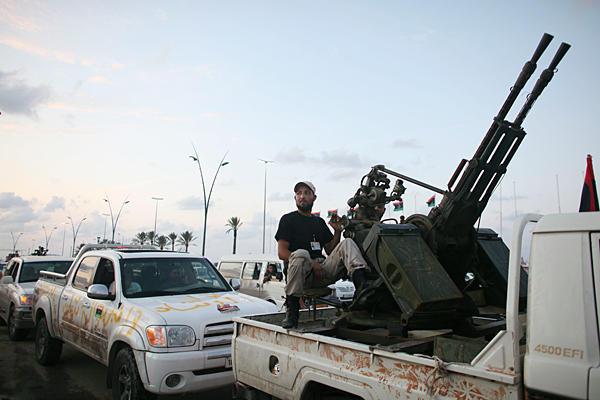By George Grant.

Tripoli, 17 December 2012:
The Warriors Affairs Commission is preparing to launch a potentially ground-breaking programme to kick-start Libya’s faltering private . . .[restrict]sector and reintegrate former revolutionaries into society.
If the Zeidan Government gives the green light, LD 500,000,000 will be set aside to assist 5,000 former fighters to establish their own small-to-medium enterprises (SMEs), either as individuals or in groups. Each revolutionary will be eligible for a maximum of LD 100,000.
The project comes as part of wider programme comprising nine different initiatives catering to a total of 143,500 warriors. Amongst the other initiatives are plans to send 5,000 fighters overseas for study; a Capacity Building & Specialised Training project to provide 10,000 places on vocational and academic courses inside Libya to help fighters in need of better qualifications; a Psychiatric & Social Support project to assist 20,000 warriors deal with post-traumatic stress; and a Public Officials Training project to prepare 2,000 warriors for public office through leadership programmes in public management, economics and social matters.
Entitled Project Ambition (Tomouh), the SME initiative was first conceived over the summer, but failed to gain traction with the former Kib Government.
“This is an ambitious development project for the Libyan economy with the will of the ambitious and courageous Libyan youth who brought down a corrupted state and are willing to rebuild a prosperous modern one”, said WAC Managing Director Mustafa Elsagezly.
“We will partner with the best international expertise such as the World Bank, the Islamic Bank of Development and the best training and educational institutes worldwide.”
Project manager Mohammed Zway says that, all being well, a pilot system should be up and running within the next three months, with government funding for the main programme coming into place as soon as possible after that.
“The aim of this plan is to involve ex-fighters in the economy of the new Libya through economic empowerment”, says Zway, a former fighter with the 17 February brigade. “We want to get these young men off the streets and into the private sector.”
To be considered, fighters must have been active participants in the revolution and joined it before 20 October 2011. Those who spent longer on the front lines and those who sustained injuries will be given priority, but the viability of their proposals will also form part of the selection criteria.
The WAC has some 140,000 revolutionaries on their books, and to date some 57,000 have submitted their names for consideration by Project Ambition.
“The ex-combatants will get basic skills training as well as training on site in the business field chosen and appropriate for them, their locality and environment” Elsagezly added.
Asked how they would prevent misappropriation of funds, and also how they can accurately determine who was a revolutionary and who were not, WAC officials insist they have the necessary mechanisms in place.
“We have accurate records of all the revolutionaries in Libya”, Zway says. “There are more than 200,000 on the database at the moment, and we have accepted 140,000. We consider two kinds of revolutionaries – those who were involved in military actions, and those involved in other actions, such as passing information.”
Earlier this year, chaos ensued when the NTC announced a grant of LD 4,000 for all married revolutionaries and LD 2,400 for unmarried ones without a proper database of who had fought and who had not. The system was subjected to widespread abuse, with some revolutionaries receiving multiple grants, and other citizens registering who were not fighters at all.
According to Amr Farkash, an economic advisor with the WAC, Project Ambition will also be safeguarded against because those involved will not be receiving cash in hand, instead the WAC will provide them with ready to operate projects.
“The LD 100,000 [per fighter] is not liquid money. Working together with the project participants, the WAC will identify what is required to get the businesses up and running and will finance that accordingly. For instance, if it’s a factory that’s wanted, the WAC will purchase the space and equipment required with the funds available.”
Farkash also says that Project Ambition will be subjected to rigorous oversight. “We will set up the right framework and appoint international well known consultants to ensure proper governance. This will make it unique from other projects that existed under Qaddafi.”
Project Ambition will be operated initially through two types of contracts: Diminishing Partnership (Musharakah Mutanaqisah) and Lease to Own (Ijarah Wa Iqtina). In the case of the Diminishing Partnership option, the WAC would make an up-front investment in the project accounting for the total required sum less the amount the fighter can afford to put up himself.
In other words, the WAC will initially own whatever percentage of the project it provides funding for with the fighters paying it back over time. “You might start with the WAC owning 80 per cent of the project and the warrior 20 per cent, or whatever the arrangement,” says Farkash”, and the warrior would pay the money back until he owns 100 per cent.”
With the Lease to Own option, the WAC would provide fighters with a loan, taking monthly repayments over a given period finished by a lump-sum repayment at the end of the term when the fighter has accumulated enough revenue to pay it. Consistent with Islamic banking principles, there would be no interest payments on this loan, instead the WAC would take a proportion of the profit margin.
An additional component of Project Ambition is the objective of bringing some capable revolutionaries into the oversight process themselves. A total of 300 will be selected for training as business consultants to provide assistance to other ex-fighters with their projects, with the added benefit of potential overseas travel and appropriate salaries. Some 50 business centres will be established across Libya from which these individuals will operate.
One clear concern with the project is the risk of excluded revolutionaries protesting they have been unjustly overlooked, but the WAC reemphasises that Project Ambition is just one of several programmes designed to ensure as many revolutionaries benefit as possible, taking advantage of different opportunities to meet their different needs and capabilities.
The Overseas Training programme, for instance, will only be eligible to fighters in possession of a Bachelor’s degree or above, whilst similar criteria as exist for Project Ambition in terms of injuries sustained and time spent on the front will also be applied. The Rehabilitation Programme, meanwhile, is geared towards those in need of additional qualifications before getting started. The former is being supported by UNESCO whilst the latter is being supported by the League of Arab States.
Other projects being planned by the WAC are a Warriors Marriage Support initiative, establishing a fund to support 1,500 fighters over the age of 40 with getting married; Workshops Rehabilitation Camps, in which 100,000 warriors will have the chance to participate in summer camps designed to help them discuss their experiences and deal with “any negative thoughts they possess”; and a Transition Programme with Civil Society Organisations, which together with the Ministry of Culture and Civil Society will seek to “transform revolutionary battalions into civil society organisations and transform their headquarters into forum institutions and training centres”.
Supporting the aforementioned National Project for Psychiatric and Social Support will be the World Health Organisation, whilst the Dubai School of Governance will be partnering with the WAC to provide the Public Officials Training project.
Collectively, the WAC programmes certainly represent an ambitious effort to help solve what is widely perceived as the most serious challenge confronting Libya at present, namely how to get former revolutionaries off the streets and back to work. “That is the main goal of the WAC”, concluded Elsagezly, “to replace arms in the hands of ex-combatants with tools to rebuild Libya and its economy.” [/restrict]








